- Home
- P J Parrish
South Of Hell lk-9
South Of Hell lk-9 Read online
South Of Hell
( Louis Kincaid - 9 )
P. J. Parrish
P. J. Parrish
South Of Hell
Chapter One
It was just south of Hell. But if you missed the road leading in, you ended up down in Bliss. And then there was nothing to do but go back to Hell and start over again.
That’s what the kid pumping gas at the Texaco had told her, at least. Since she had not been here for such a very long time, she had to trust him, because she had no memory of the place anymore.
A rain was threatening. She had been watching the gray clouds gather over the cornfields for the past half-hour.
“You sure you know where you’re going, little lady?”
She looked over at the driver of the truck. He was an old man, with tufts of gray hair sprouting from his head and ears.
Back at the Texaco, she had watched all the big trucks racing past on the highway, too afraid to stop one of them for a ride. When the old man had pulled in, she had gotten into his truck only because the truck was small and he seemed so old and harmless. Still, she clutched the backpack tighter as she felt his eyes on her.
“Yes,” she said. “Lethe Creek Road. It should be right up here somewhere.”
The old man’s red-rimmed eyes stayed with her for a moment, then he looked back at the road. She didn’t look at him, because she didn’t want to talk to him. She just wanted to get where she needed to go.
The backpack was heavy on her lap, and she shifted her thighs under its weight. It had been hard lugging it all this way, but she had no idea when she set out what she was going to need, or for how long, so she had put everything in it she could carry: cans of tuna fish and stewed tomatoes, tins of sardines, a half-empty box of Hershey’s cocoa, and a carton of Premium saltines. Anything she could find in the house that would last. She had even thought to take an empty plastic milk carton to hold water. At the last minute, she had gone down into the cellar and taken the last four jars of plum preserves.
No one would know they were gone. No one would know she was gone.
“This the road?”
She glanced at the old man, then looked out the window. The fields were empty, still covered with their blankets of winter straw. She nodded, and they drove on.
A dull roll of thunder came from the gray sky over the fields.
“Looks like we got more rain coming,” the old man said.
She closed her eyes. A different sound in her ears, a different storm in her head, a flashing memory of green curtains twisting in the wind.
Run! Run! Run!
Bursting through the green curtain. Feeling the corn stalks tearing at her bare legs. Kneeling in dirt, hands over her ears so she wouldn’t hear.
The image made her go cold. It was new. It had never been there before. Or that voice, either. Others, yes, but not this one.
She felt a jolt as the truck left the blacktop for gravel, and she opened her eyes.
“Huh, look at that. I didn’t even know there was a house down this road.”
She didn’t look at the old man. Her eyes were on the old house. It had always been so small in her memory because she had never really believed it existed. But now here it was, growing larger and larger and larger.
The truck stopped in front of a fence. She didn’t move. She couldn’t stop looking at the house.
“This it?”
She didn’t hear the old man.
“Little lady? You sure this is the place you’re looking for?”
She found her voice. “Yes.” But she didn’t take her eyes off the house, because she was sure if she did, it would slip away, just like it always did as she awoke from her fevered sleep. It was a while before the ticking of the truck’s old engine drew her back. The house hadn’t vanished.
She gathered the backpack to her chest and looked over at the old man. “Thank you for the ride,” she said.
His mouth was a hard slash, but his eyes were gentle. “You shouldn’t be takin’ rides from strangers. Not right for a young girl to be hitchin’.”
She nodded.
“Looks deserted. You got kin here?”
“Yes, sir.”
He looked toward the house with doubt but then reached across her and opened the door. She jumped out, hoisting the backpack up onto one shoulder. The old man gave her a final look, thrust the truck in reverse, and was gone.
She looked around. The farm’s other buildings registered in her consciousness — three small gray plank ones almost hidden in the tall weeds and, beyond, the barn, a looming hulk against the dark sky. She looked back at the old farmhouse.
It had always been there in her head, like a blurry picture, but now the details were coming into focus: red brick, green roof, long slits of windows. Everything angles, crags, points, and hard lines, like there was not a corner of comfort to be found anywhere inside.
It started to rain. It was so quiet the pop-pop-pop of the drops falling on the oak leaves overhead was the only sound she could hear. Even the voices were quiet, like they were all holding their breath, waiting.
She climbed the locked fence and walked to the porch. There was a padlock on the front door. It hadn’t been visible from the truck. The old man would never have left her here if had he seen it.
You got kin here?
Yes, sir.
She had lied to him. There was no one here. Anybody could see that plain as day. Maybe she had always known it was going to be like this. But that was why she was here now, because she had to make sure.
Her heart was starting to pound, and she felt a choking feeling rising in her throat, that feeling she got sometimes that she couldn’t catch her breath. She took a few deep, careful breaths to calm it, but something told her that this time it wasn’t going to work. She was sweating, too, even in the cold rain.
She forced herself to start moving again. Walking slowly, the backpack heavy on her shoulder, she went around the east side of the house.
Another porch, this one crumbling and decrepit, with a rusting icebox shoved into a corner. There was a door but it was boarded over.
No way in — and she had to get in.
She was behind the house now, picking her way carefully through the waist-high weeds. Just more windows, too high for her to reach, some with boards nailed over them. By the time she made a full circle back to the side porch, her heart was racing, and her head hurt so much she had to close her eyes for a moment.
That’s when it came. A flash of a new image — a blue wooden door. She opened her eyes. But where was it?
She returned to the back of the house, her eyes raking the thicket of weeds. The blue door was here, she knew it was.
No, wait, no. Two blue doors. But where?
She pushed her way through the brambles. Her hands began to bleed as she pulled at the thick wet growth. She drew back, gasping.
Cellar doors. Old wood boards cracked and bleached, the blue gone almost to gray.
She set the backpack in the weeds, grabbed one of the handles, and pulled. It opened with a groan and fell back against the weeds with a thud.
She stared down into the dark. Then, without another thought, she grabbed the backpack and went down.
Five steps down. She knew that!
And although there was no light in this place, she knew she had to go to the right. Because that was where the other stairs were, the ones that led up into the house.
Awful smells of dank stone and wet earth and the skittering whispers of animals, but she didn’t stop to think about it, just moved slowly but surely through the darkness until her outstretched hand found the wood rail.
Ten steps up. She knew that, too.
At the top, she pushed the door open and stepped
through.
Gray light, like a shroud, around her. Dim shapes floated at the edges of her vision — just furniture and boxes — and a wash of smells, dust and paper and something sickly sweet but so faint she almost thought she imagined it.
She dropped the backpack to the floor and moved slowly down a narrow hallway. It led to a small room with faded green wallpaper peeling away in damp layers. The next room was like the first but with yellow flowered paper, most of it in piles on the scuffed wood floor. A third room had light fixtures dangling bare wires and more moldering walls shedding their paper skins.
She stood in the center of the third room, a cold draft swirling around her. It felt like the house itself was moving around her and she was inside it, inside its heart, inside the heart of a dying animal.
Voices.
Where were they coming from? They had always been inside her head before, but now…
Outside her head now. Like they were just a step away in the next room. She went to the front of the house.
Another small room, this one with blue-patterned wallpaper and yellowed lace curtains. The voices were loud here, louder than the usual whisper. And they were-
She turned.
There, in the far corner, she saw it, a small upright piano, dark wood under a gray coat of dust, the top heaped with long, thin boxes.
The voices, so loud here, the same ones that came to her when she slept. She had never been able to make out what they were saying. But now…
She stared at the piano.
Suddenly, she could hear them perfectly. The voices were singing!
Catch Don set a seal
Oh do you know so sweet
You and me, Pearl, no matter hurt.
New rips in two in stormy. Sue lures while
You pray on guard all day trembling a while.
The sting of tears in her eyes. The voices were real. She hadn’t been crazy, she hadn’t made them up. Those voices that always came to her in her dreams. They were real, and they were singing real words. The words made no sense, but she didn’t care. The words were real, and so was this place, and so was she.
You and me, Pearl, no matter hurt.
She shut her eyes tight. The voices were getting louder.
You and me, Pearl, no matter hurt
You and me Pearl no matter hurt
youandmepearlnomatterhurt
hurt hurt hurt
hurt hurt hurt!
Suddenly, a loud bang. It felt like the floor was moving beneath her feet, like the walls were moving inward. She bolted from the room.
Another bang. Just thunder, just thunder. But it propelled her forward.
She was back in the kitchen. Rain was beating on the small window over the old sink. Or was the beating sound in her head? She couldn’t tell anymore, because something bad was happening. Something was rising up inside her, worse than anything she had felt before, something bad beyond her heart when it beat too fast and beyond her skin when it grew slick with sweat and beyond her head when the voices shouted.
This place, this room. Something bad here.
A boom of thunder. She clapped her hands over her ears and shut her eyes.
But she could still see it, see it playing on the curtain of her lids. Red. So much red. A thick flow of red everywhere.
Run! Run! Run, Amy! Run! Hide!
She opened her eyes.
The cupboard. There, in the corner, near the sink.
She dropped to her knees, her fingers grasping the rusted handle. The door opened, and she crawled inside. She pulled the door closed and pressed into the dark corner. Tried to make herself small, smaller, smallest until she disappeared.
She started to cry.
Then. Then…
A whisper. That one soft voice that sometimes found her in her dreams, rising out of the screeches of the others, coming to her in this dark place now, soft around her like a blanket.
You and me, no matter how hurt
You and me you and me
The other voices faded away. The banging stopped. It was quiet. The invisible blanket was still there, holding her.
You got kin here?
She hugged her knees and rocked herself in the dark.
“Yes,” she whispered. “Yes, yes, yes.”
Chapter Two
They had been down this road before. They had been down it so many times that even with the night as dark as it was, even without the blue wash of a moon above or the yellow glow from a house nearby to help light their way, they knew where they were going.
Still, Louis had the feeling something was different this time.
“You okay?” he asked.
The tall man walking by his side didn’t answer.
“Mel?”
“Yeah.” A clearing of his throat, like the crunching of the gravel under their shoes. “Yeah… yeah. I’m fine.”
Louis didn’t look over at his friend, didn’t have to. He knew Mel Landeta was lying. Something had been bothering him all night. Louis sensed it from the moment they sat down to eat at Timmy’s Nook. The talk over grouper sandwiches and beer had been of the usual stuff: the Miami Heat’s seven-game skid, cop gossip from O’Sullivan’s, and how Louis had spent the last week sitting outside a Fort Myers motel so some guy could prove his wife was cheating on him.
When the small talk and beers had run out, Mel had gone mute. And now, as they walked the dark stretch of road back to Louis’s cottage, his quiet hung heavy in the cool April air.
“Mel, what’s on your mind?” Louis asked finally.
A long pause. “Lizards,” he said.
“What?”
“You heard me, lizards.”
“Mel, if you don’t want to talk-”
“I’m serious. I was thinking about the lizard I saw out on your porch. It had no tail.”
“The cat probably got it,” Louis said.
Mel was quiet for a moment. “Lizards can grow their tails back. Do you know that?”
Louis shook his head slowly, knowing Mel couldn’t see it.
“Lizards, sponges, starfish, even worms. They can all regrow their body parts,” Mel said.
They walked on, slowly.
“And newts,” Mel said. “You poke out a newt’s eye, and you know what happens? He grows a new eye. So that’s what I have been thinking about. How come a fucking newt can grow a new eye and fucking scientists can’t figure out why a fucking human being can’t?”
A car rounded the bend ahead of them, and Louis blinked in the glare of the headlights. They waited on the sandy shoulder until it passed.
“How about one more beer before I drive you back?” Louis said.
“I guess one more won’t kill me,” Mel said.
When they got to the low dune that fronted the cottage, Louis put a hand on Mel’s arm and guided him across the dark yard. Mel stood on the screened-in porch until Louis flicked a light on in the living room.
“You live like a pig, Kincaid,” Mel said.
“I just cleaned this morning,” Louis said, going to the refrigerator.
“Dirty socks and cat poop. Get some air freshener.”
Louis brought two Heinekens back. Mel took one and folded his long body down onto the sofa. Louis flopped into the chair opposite, watching Mel. He hadn’t seen him in a couple of weeks. Still, theirs was an old-marriage kind of friendship, where long pauses in conversation were left unfilled and long times apart needed no rebuilt bridges. It was the kind of friendship where one man knew when to walk a wide berth around the other. But this, Louis sensed, was not one of those times.
“Your eyes bothering you?” Louis asked.
Mel was holding the beer bottle against his forehead. “I already gave up driving. Maybe I’ll give up walking next.”
Louis took a long pull from the beer. The silence lengthened. Finally, Louis picked up the remote and flicked on the TV but kept the volume off. Miami Vice was on. Louis watched Sonny steer a speeding Cigarette boat down the Intracoastal, the b
oat’s fishtail wake sparkling against the pastel blur of hotels. Louis noticed Mel was staring at the TV, but he knew his friend couldn’t make out any of the details. Mel had been battling retinitis pigmentosa for almost ten years now, and he saw life as if through a plastic shower curtain. That was how Mel once described it — when he talked about it, which wasn’t often.
“Do you ever think about past lives?” Mel said.
Louis looked over at him. “What do you mean?”
“What your life might have been like if you had done things differently.”
Louis took a drink of beer. “No.”
“I’ve been thinking about it a lot lately,” Mel went on. “Thinking about my life before I hit that kid.”
Mel had told him the story. How when his failing eyesight first set in, Mel had refused to acknowledge it, refused to tell his chief that he no longer had any business being behind the wheel of a police cruiser. Then one night in Miami, a couple of years ago, Mel broadsided a car he hadn’t seen coming. The seventeen-year-old kid driving the car spent a year in physical therapy. Mel had been forced to resign quietly but had talked his way into a detective’s job on the smaller Fort Myers PD — until he finally turned in his badge on his own. He’d been living on disability ever since, sometimes helping Louis with his PI cases.
“I think we live many lives inside this one,” Mel said. “Lives that begin and end in an instant, like the eight seconds it took me to hit that kid. Or the minute or so it takes to tell someone you don’t love them anymore.”
Louis looked down at the beer bottle, wiping the condensation with his thumb and wishing Mel would shut up. He was dangerously close to wandering into something he and Louis had never talked about: Mel’s long-ago relationship with Joe, Louis’s girlfriend.
“Fuck, I’m sorry,” Mel said. “I’m done ruminating. But I’m not done drinking. Get me another, would you?”
Louis went to the kitchen, grabbing another beer for himself, too, figuring Mel was about fifteen minutes away from falling asleep on the sofa, saving Louis the long drive back over the causeway to Fort Myers.

 South of Hell (Louis Kincaid Mysteries)
South of Hell (Louis Kincaid Mysteries)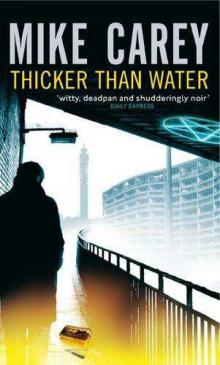 Thicker Than Water
Thicker Than Water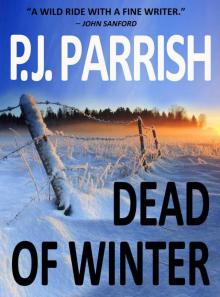 Dead of Winter
Dead of Winter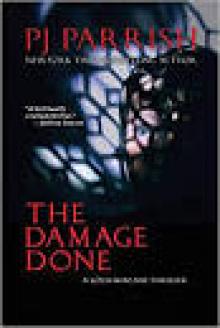 The Damage Done
The Damage Done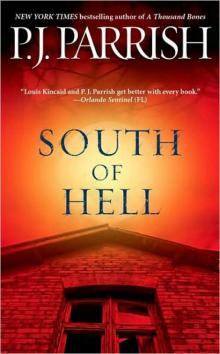 South Of Hell lk-9
South Of Hell lk-9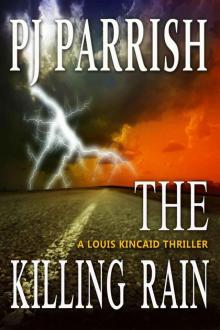 A Killing Rain
A Killing Rain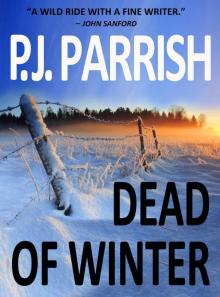 Dead of Winter lk-2
Dead of Winter lk-2 Island of Bones
Island of Bones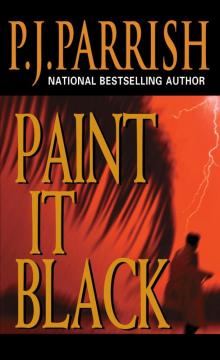 Paint It Black
Paint It Black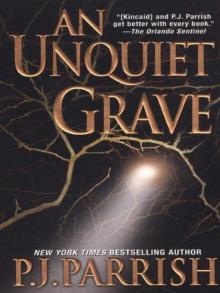 An Unquiet Grave (Louis Kincaid Mysteries)
An Unquiet Grave (Louis Kincaid Mysteries) She's Not There
She's Not There